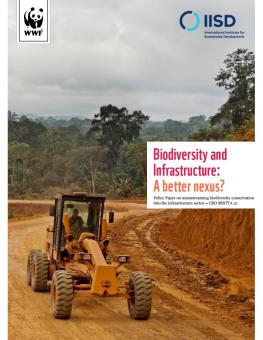
Biodiversity and Infrastructure: A better nexus?
In this brief, the World Wide Fund for Nature (WWF) and the International Institute for Sustainable Development (IISD) provide initial policy guidance for parties to consider prior to COP 14 in Egypt on how biodiversity mainstreaming can be reconciled with the infrastructure sector.
During the 13th Conference of Parties (COP) to the Convention on Biological Diversity (CBD) decided that the next COP would ultimately continue the “Mainstreaming of biodiversity into the sectors of energy and mining, infrastructure, manufacturing and processing industry, and health”.
The 21st meeting of the Subsidiary Body on Scientific, Technical and Technological Advice (SBSTTA) will discuss initial draft propositions under Item 6 of the agenda.
In this brief, the World Wide Fund for Nature (WWF) and the International Institute for Sustainable Development (IISD) provide initial policy guidance for parties to consider prior to COP 14 in Egypt on how biodiversity mainstreaming can be reconciled with the infrastructure sector.
Description provided by WWF Switzerland.
Participating experts
You might also be interested in
The Role of Multilateral Development Banks for Low-Carbon Procurement in the Infrastructure Sector
This report examines the critical role of multilateral development banks (MDBs) in advancing low-carbon procurement within the infrastructure sector.
Sustainable Asset Valuation of the Nutrition Sensitive Agriculture Capacity Strengthening Project in Ethiopia
This report analyzes the social, economic, and environmental outcomes of implementing agroforestry and climate-smart agriculture in Ethiopia.
Europe’s Dash for Gas in Africa puts Private Profits First
Europe’s demand for gas is contributing to expansion of LNG projects in Mozambique, Nigeria, and Senegal. This favours the interests of European oil and gas companies over those of African countries, a new report shows.
Sustainable Asset Valuation (SAVi) of Aquaculture in Madagascar
In this integrated cost-benefit analysis, the Nature-Based Infrastructure Global Resource Centre analyzes the potential of sustainable aquaculture practices to enhance nutrition and protect the environment in Madagascar.